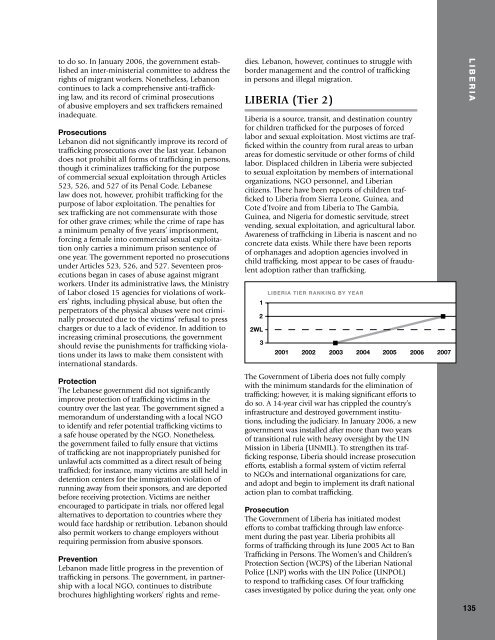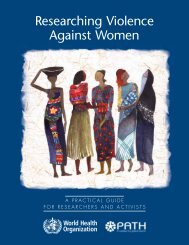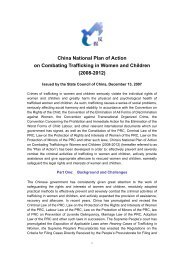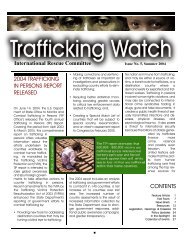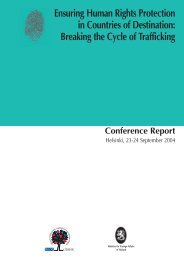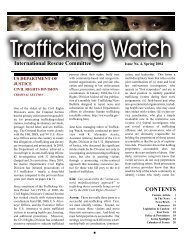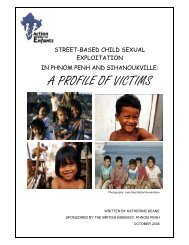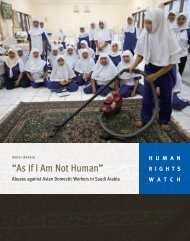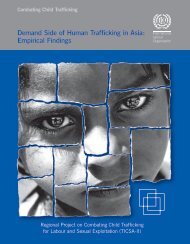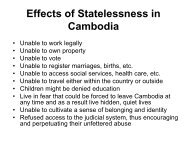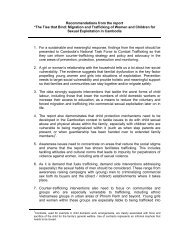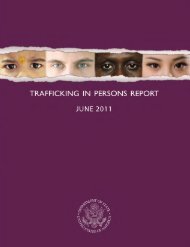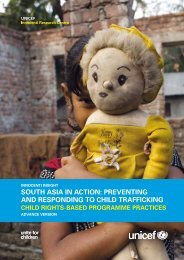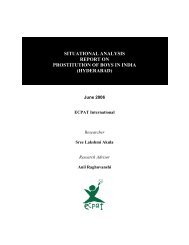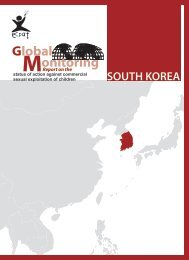2007 Trafficking in Persons Report - Center for Women Policy Studies
2007 Trafficking in Persons Report - Center for Women Policy Studies
2007 Trafficking in Persons Report - Center for Women Policy Studies
Create successful ePaper yourself
Turn your PDF publications into a flip-book with our unique Google optimized e-Paper software.
to do so. In January 2006, the government established<br />
an <strong>in</strong>ter-m<strong>in</strong>isterial committee to address the<br />
rights of migrant workers. Nonetheless, Lebanon<br />
cont<strong>in</strong>ues to lack a comprehensive anti-traffick<strong>in</strong>g<br />
law, and its record of crim<strong>in</strong>al prosecutions<br />
of abusive employers and sex traffickers rema<strong>in</strong>ed<br />
<strong>in</strong>adequate.<br />
Prosecutions<br />
Lebanon did not significantly improve its record of<br />
traffick<strong>in</strong>g prosecutions over the last year. Lebanon<br />
does not prohibit all <strong>for</strong>ms of traffick<strong>in</strong>g <strong>in</strong> persons,<br />
though it crim<strong>in</strong>alizes traffick<strong>in</strong>g <strong>for</strong> the purpose<br />
of commercial sexual exploitation through Articles<br />
523, 526, and 527 of its Penal Code. Lebanese<br />
law does not, however, prohibit traffick<strong>in</strong>g <strong>for</strong> the<br />
purpose of labor exploitation. The penalties <strong>for</strong><br />
sex traffick<strong>in</strong>g are not commensurate with those<br />
<strong>for</strong> other grave crimes; while the crime of rape has<br />
a m<strong>in</strong>imum penalty of five years’ imprisonment,<br />
<strong>for</strong>c<strong>in</strong>g a female <strong>in</strong>to commercial sexual exploitation<br />
only carries a m<strong>in</strong>imum prison sentence of<br />
one year. The government reported no prosecutions<br />
under Articles 523, 526, and 527. Seventeen prosecutions<br />
began <strong>in</strong> cases of abuse aga<strong>in</strong>st migrant<br />
workers. Under its adm<strong>in</strong>istrative laws, the M<strong>in</strong>istry<br />
of Labor closed 15 agencies <strong>for</strong> violations of workers’<br />
rights, <strong>in</strong>clud<strong>in</strong>g physical abuse, but often the<br />
perpetrators of the physical abuses were not crim<strong>in</strong>ally<br />
prosecuted due to the victims’ refusal to press<br />
charges or due to a lack of evidence. In addition to<br />
<strong>in</strong>creas<strong>in</strong>g crim<strong>in</strong>al prosecutions, the government<br />
should revise the punishments <strong>for</strong> traffick<strong>in</strong>g violations<br />
under its laws to make them consistent with<br />
<strong>in</strong>ternational standards.<br />
Protection<br />
The Lebanese government did not significantly<br />
improve protection of traffick<strong>in</strong>g victims <strong>in</strong> the<br />
country over the last year. The government signed a<br />
memorandum of understand<strong>in</strong>g with a local NGO<br />
to identify and refer potential traffick<strong>in</strong>g victims to<br />
a safe house operated by the NGO. Nonetheless,<br />
the government failed to fully ensure that victims<br />
of traffick<strong>in</strong>g are not <strong>in</strong>appropriately punished <strong>for</strong><br />
unlawful acts committed as a direct result of be<strong>in</strong>g<br />
trafficked; <strong>for</strong> <strong>in</strong>stance, many victims are still held <strong>in</strong><br />
detention centers <strong>for</strong> the immigration violation of<br />
runn<strong>in</strong>g away from their sponsors, and are deported<br />
be<strong>for</strong>e receiv<strong>in</strong>g protection. Victims are neither<br />
encouraged to participate <strong>in</strong> trials, nor offered legal<br />
alternatives to deportation to countries where they<br />
would face hardship or retribution. Lebanon should<br />
also permit workers to change employers without<br />
requir<strong>in</strong>g permission from abusive sponsors.<br />
Prevention<br />
Lebanon made little progress <strong>in</strong> the prevention of<br />
traffick<strong>in</strong>g <strong>in</strong> persons. The government, <strong>in</strong> partnership<br />
with a local NGO, cont<strong>in</strong>ues to distribute<br />
brochures highlight<strong>in</strong>g workers’ rights and remedies.<br />
Lebanon, however, cont<strong>in</strong>ues to struggle with<br />
border management and the control of traffick<strong>in</strong>g<br />
<strong>in</strong> persons and illegal migration.<br />
LIBERIA (Tier 2)<br />
Liberia is a source, transit, and dest<strong>in</strong>ation country<br />
<strong>for</strong> children trafficked <strong>for</strong> the purposes of <strong>for</strong>ced<br />
labor and sexual exploitation. Most victims are trafficked<br />
with<strong>in</strong> the country from rural areas to urban<br />
areas <strong>for</strong> domestic servitude or other <strong>for</strong>ms of child<br />
labor. Displaced children <strong>in</strong> Liberia were subjected<br />
to sexual exploitation by members of <strong>in</strong>ternational<br />
organizations, NGO personnel, and Liberian<br />
citizens. There have been reports of children trafficked<br />
to Liberia from Sierra Leone, Gu<strong>in</strong>ea, and<br />
Cote d’Ivoire and from Liberia to The Gambia,<br />
Gu<strong>in</strong>ea, and Nigeria <strong>for</strong> domestic servitude, street<br />
vend<strong>in</strong>g, sexual exploitation, and agricultural labor.<br />
Awareness of traffick<strong>in</strong>g <strong>in</strong> Liberia is nascent and no<br />
concrete data exists. While there have been reports<br />
of orphanages and adoption agencies <strong>in</strong>volved <strong>in</strong><br />
child traffick<strong>in</strong>g, most appear to be cases of fraudulent<br />
adoption rather than traffick<strong>in</strong>g.<br />
The Government of Liberia does not fully comply<br />
with the m<strong>in</strong>imum standards <strong>for</strong> the elim<strong>in</strong>ation of<br />
traffick<strong>in</strong>g; however, it is mak<strong>in</strong>g significant ef<strong>for</strong>ts to<br />
do so. A 14-year civil war has crippled the country’s<br />
<strong>in</strong>frastructure and destroyed government <strong>in</strong>stitutions,<br />
<strong>in</strong>clud<strong>in</strong>g the judiciary. In January 2006, a new<br />
government was <strong>in</strong>stalled after more than two years<br />
of transitional rule with heavy oversight by the UN<br />
Mission <strong>in</strong> Liberia (UNMIL). To strengthen its traffick<strong>in</strong>g<br />
response, Liberia should <strong>in</strong>crease prosecution<br />
ef<strong>for</strong>ts, establish a <strong>for</strong>mal system of victim referral<br />
to NGOs and <strong>in</strong>ternational organizations <strong>for</strong> care,<br />
and adopt and beg<strong>in</strong> to implement its draft national<br />
action plan to combat traffick<strong>in</strong>g.<br />
Prosecution<br />
The Government of Liberia has <strong>in</strong>itiated modest<br />
ef<strong>for</strong>ts to combat traffick<strong>in</strong>g through law en<strong>for</strong>cement<br />
dur<strong>in</strong>g the past year. Liberia prohibits all<br />
<strong>for</strong>ms of traffick<strong>in</strong>g through its June 2005 Act to Ban<br />
<strong>Traffick<strong>in</strong>g</strong> <strong>in</strong> <strong>Persons</strong>. The <strong>Women</strong>’s and Children’s<br />
Protection Section (WCPS) of the Liberian National<br />
Police (LNP) works with the UN Police (UNPOL)<br />
to respond to traffick<strong>in</strong>g cases. Of four traffick<strong>in</strong>g<br />
cases <strong>in</strong>vestigated by police dur<strong>in</strong>g the year, only one<br />
L I B E R I A<br />
135


